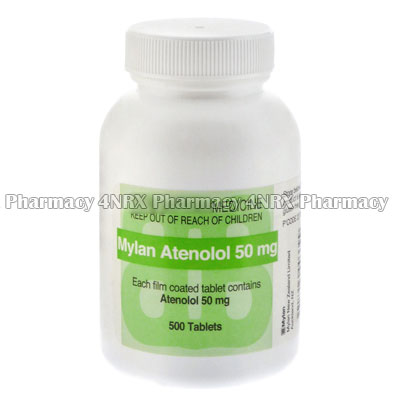 |
Home  Heart Heart  Atenolol (Atenolol) Atenolol (Atenolol) |
|
|||||||||
|
|
Atenolol (Atenolol)
What is Atenolol (Atenolol) used for? Atenolol (Atenolol) is an oral beta-blocker used to treat patients suffering from high blood pressure, angina, or arrhythmias. The medication operates by lowering the heart rate and reducing blood pressure to decrease the amount of work required to circulate the blood. This action may also make it useful for improving health and reducing immediate risk following a heart attack. Your physician may prescribe it to treat other unlisted conditions, as well. How should I use Atenolol (Atenolol)? Follow your physician's instructions while using Atenolol (Atenolol) to get the most effective results from treatment. The normal dosage is one or two daily doses of one tablet, but your particular instructions will depend on the condition being treated, your health, and the severity of your symptoms. Swallow these doses whole with a large glass of water. They may be taken on an empty stomach, but a snack or meal is recommended before use if you experience nausea. Never change the form of the tablets by splitting or crushing them as this may destroy or alter the effects of their contents. Ask your pharmacist or physician any questions you have to ensure the correct administration. What are the side effects of Atenolol (Atenolol)? Side effects that may occur while using Atenolol (Atenolol) are:
Serious side effects that may require emergency medical attention are faintness, unusual swelling of the feet, bradycardia, difficulty breathing, depression, cold sensations in the extremities, darkened urine, discolored stools, or jaundice. Inform your physician as soon as you experience any worrying or intense symptoms to make sure the correct alterations are made to your regimen to prevent further complications from occurring. Please Note Do not use Atenolol (Atenolol) if the patient being treated is a child, if you have uncontrolled heart failure, peripheral arterial disorders, metabolic acidosis, 2nd or 3rd degree heart block, cardiogenic shock, sick sinus syndrome, an untreated tumor affecting the adrenal gland, or bradycardia. It is also important to inform your physician if you are elderly, allergic to beta-blockers, if you have an overactive thyroid gland, a history of heart failure, history of asthma, psoriasis, myasthenia gravis, diabetes, chronic obstructive pulmonary disease, 1st degree heart block, hypoglycemia, decreased kidney function, or decreased liver function. These conditions may cause unexpected problems requiring lower dosages or reduced frequency of administration. Strictly follow all instructions provided to you by your physician or pharmacist while using Atenolol (Atenolol). Optimum and safe dosage can differ based on the patient and the condition being treated. As this medication may be unsafe for certain patients, it is essential you always inform your physician if you are pregnant or breastfeeding, as well as if you have any allergies, other illnesses, or ongoing health conditions, and if you are taking any other form of medication, supplements, or herbal products. Immediately seek emergency medical care if you have an allergic or hypersensitive reaction. Common signs of a reaction include hives, swelling, skin rashes, chest pains, as well as trouble breathing or swallowing. 
|
||||||||||||||||||||||